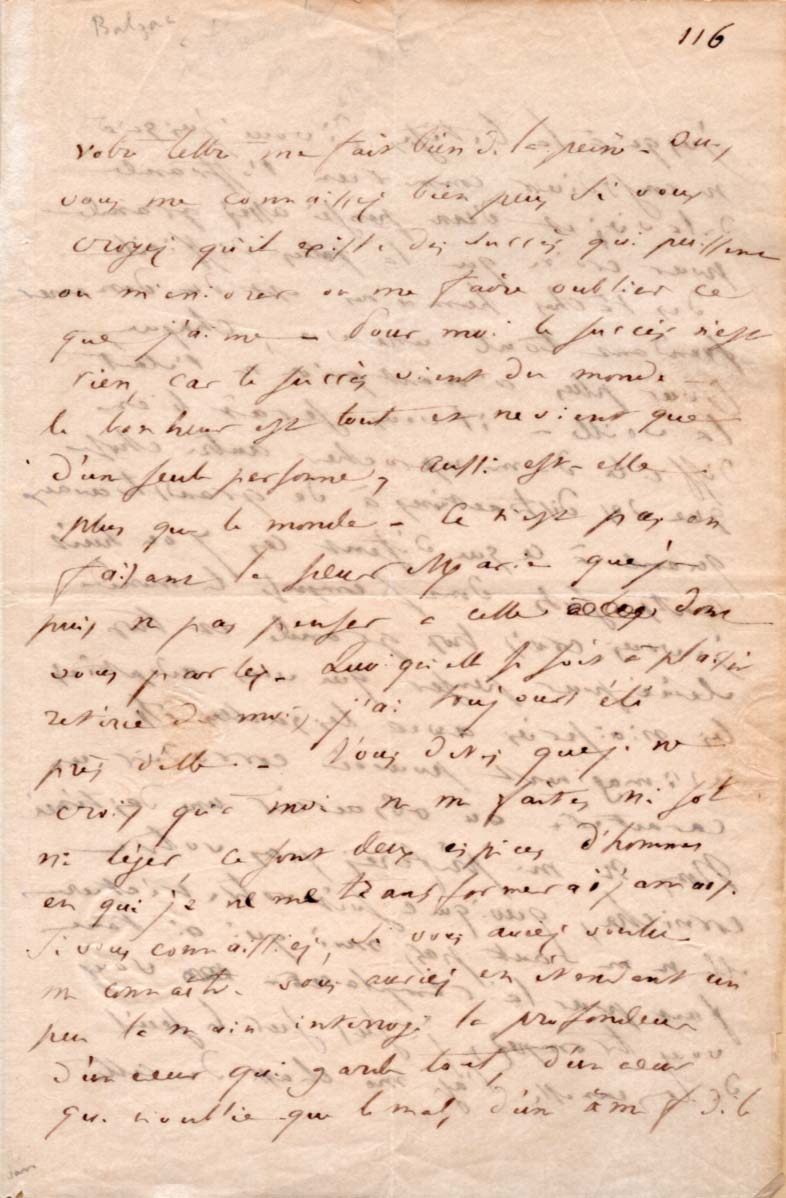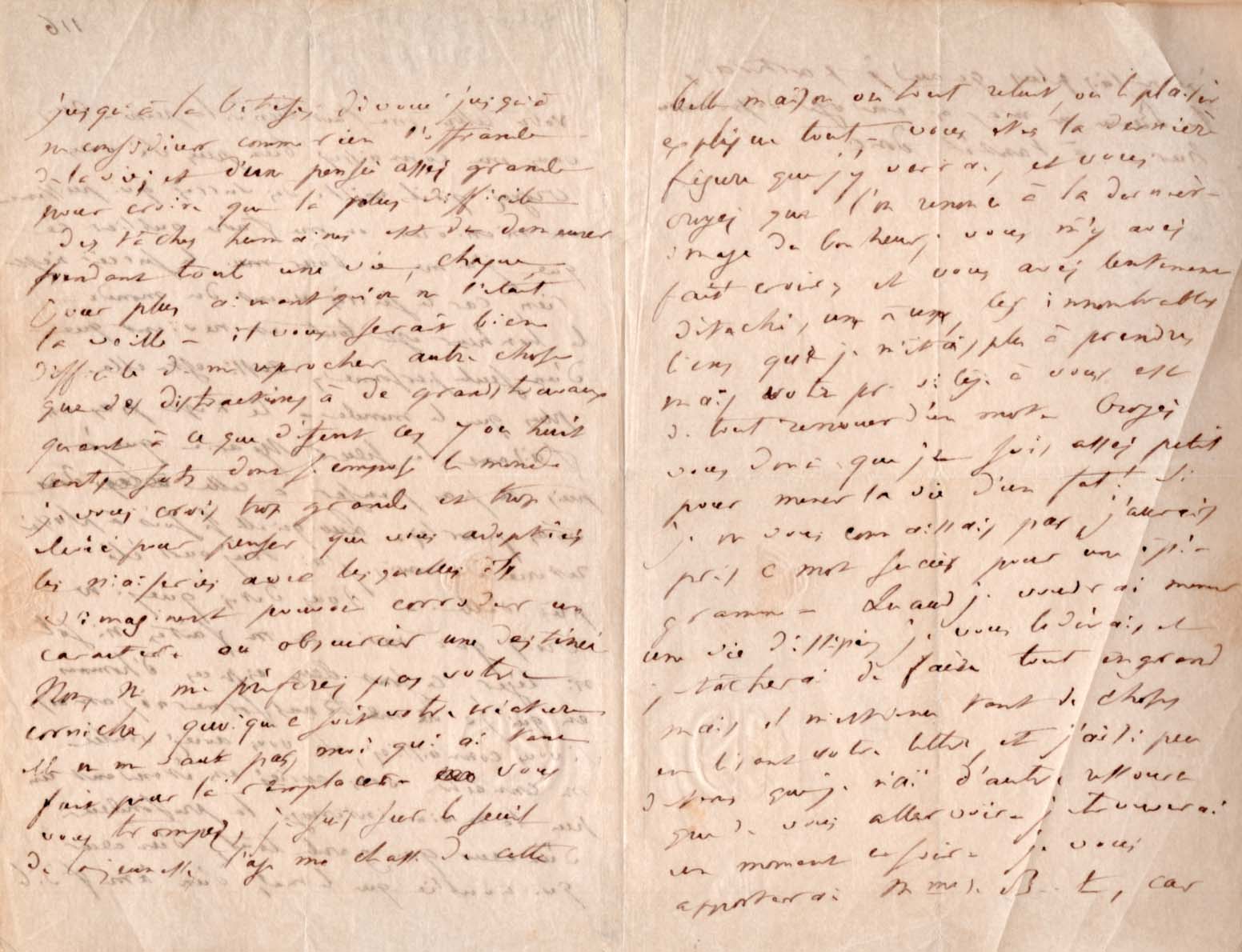Description
In parts:
"Votre lettre me fait bien de la peine. Oui, vous me connaissez bien peu, si vous croyez qu'il existe des succès qui puissent ou m'enivrer ou me faire oublier ce que j'aime. Pour moi le succès n'est rien, car le succès vient du monde ; le bonheur est tout et ne vient que d'une seule personne, aussi est-elle plus que le monde. Ce n'est pas en faisant la Soeur Marie [Soeur Marie des Anges, projet abandonné en partie repris dans les Mémoires de deux jeunes mariées] que je puis ne pas penser à celle dont vous parlez. Quoiqu'elle se soit à plaisir retirée de moi, j'ai toujours été près d'elle. Vous dites que je ne crois qu'à moi. Ne me faites ni sot ni léger, ce sont deux espèces d'hommes en qui je ne me transformerai jamais. Si vous [me] connaissiez, si vous aviez voulu me connaître, vous auriez en étendant un peu la main interrogé la profondeur d'un coeur qui garde tout, d'un coeur qui n'oublie que le mal, d'un ami fidèle jusqu'à la bêtise, dévoué jusqu'à ne considérer comme rien l'offrande de sa vie ; et d'une pensée assez grande pour croire que la plus difficile des tâches humaines est de demeurer pendant toute une vie, chaque jour plus aimant qu'on ne l'était la veille. Il vous serait bien difficile de me reprocher autre chose que des distractions à de grands travaux ; quant à ce que disent ces 7 ou huit cents sots dont se compose le monde je vous crois trop grande et trop élevée pour penser que vous adoptiez les niaiseries avec lesquelles ils s'imaginent pouvoir corroder un caractère ou obscurcir une destinée. Non, ne me préférez pas votre corniche, quoique ce soit votre créature elle ne me vaut pas moi qui ai tant fait pour la remplacer. Vous vous trompez, je suis sur le seuil de la jeunesse, l'âge me chasse de cette belle maison où tout reluit, où le plaisir explique tout ; vous êtes la dernière figure que j'y verrai, et vous croyez que l'on renonce à la dernière image du bonheur ; vous m'y avez .../... fait croire et vous avez lentement détaché, un à un, les innombrables liens que je m'étais plu à prendre, mais votre privilège à vous est de tout renouer d'un mot. Croyez-vous donc que je sois assez petit pour mener la vie d'un fat ! Si je ne vous connaissais pas j'aurais pris le mot succès pour une épigramme. Quand je voudrai mener une vie dissipée je vous le dirai et je tâcherai de faire tout en grand, mais il m'est venu tant de choses en lisant votre lettre et j'ai si peu de tems que je n'ai d'autre ressource que de vous aller voir.
Je trouverai un moment ce soir. Je vous apporterai Mme de B...t [probablement le manuscrit de La Femme abandonnée, dont l'héroïne est Mme de Beauséant], car je ne sais plus quand je partirai, la Revue ne m'a pas envoyé d'épreuves hier, à tantôt donc."
Translated:
"Your letter pains me very much. Yes, you know me very little, if you believe that there are successes which can either intoxicate me or make me forget what I love. For me success is nothing, because success comes from the world; happiness is everything and only comes from one person, so it is more than the world. It is not by doing Sister Marie [Sister Marie des Anges, abandoned project partly taken up in the Memoirs of two young brides] that I can not think of the one you are talking about. Although she gladly withdrew from me, I was always close to her. You say that I only believe in myself. Don't make me stupid or frivolous, they are two kinds of men I will never transform myself into. If you knew [me], if you had wanted to know me, you would have, by stretching out your hand a little, questioned the depth of a heart that guards everything, of a heart that only forgets evil, of a faithful friend to the point of stupidity, devoted to the point of considering the offering of his life as nothing; and of a thought big enough to believe that the most difficult of human tasks is to remain for a lifetime, each day more loving than one was the day before. It would be very difficult for you to reproach me for anything other than distractions from great works; as for what these seven or eight hundred fools of which the world is made up say, I believe you are too great and too lofty to think that you adopt the nonsense with which they imagine they can corrode a character or darken a destiny. No, do not prefer your cornice to me, although it is your creature, it is not equal to me, who have done so much to replace it. You are mistaken, I am on the threshold of youth, age chases me from this beautiful house where everything shines, where pleasure explains everything; you are the last figure I will see there, and you believe that one renounces the last image of happiness; you have me there.../...
made believe and you slowly undid, one by one, the innumerable bonds that I had taken pleasure in taking, but your privilege is to reconnect everything with a word. Do you believe that I am small enough to lead the life of a fop! If I didn't know you I would have taken the word success for an epigram. When I want to lead a dissipated life I will tell you and I will try to do everything on a grand scale, but so many things have occurred to me while reading your letter and I have so little time that I have no other resource than to go and see you.
I'll find a moment tonight. I will bring you Mme de B...t [probably the manuscript of La Femme abandoned, whose heroine is Mme de Beauséant], because I no longer know when I will be leaving, the Revue did not send me any proofs yesterday, see you later."
Further Information on the person
Profession:
(Honore de-Honore de) Honore de
Year of Birth: 1799
Certificate of authenticity
All of our pieces are sold with a Certificate of Authenticity. If a piece turns out to be wrong or if you do not like an autograph, you will get your money back for a lifetime.
Payment & Security
Your payment information is processed securely. We do not store credit card details nor have access to your credit card information.



